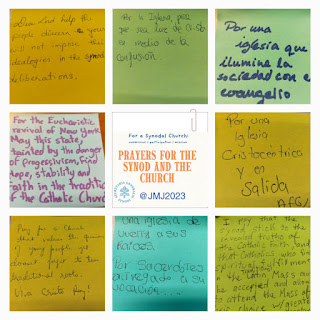Why is St. Michael portrayed stabbing Satan in the mouth? Reflection by Fr. Peter Miller OSB
Papal Populism and Movementism
In Noting That Overlong Sunday Masses Are Driving Down Church Attendance, Cardinal Dolan Vindicates Critics of the Liturgical Reform
Cardinal Timothy Dolan of New York recently published an article about why Catholics are not coming to Sunday Mass any more. The top reason: Mass is too long. He also notes that the "Liturgy of the Word"— readings from scripture— now overshadows the "Liturgy of the Eucharist," leading the Eucharist to become an "afterthought."
Annual Requiem Mass in Westminster Cathedral cancelled
 |
| LMS Annual Requiem 2018, celebrated by the retired Bishop Patrick Campbell, in Westminster Cathedral. |
28th September 2023
The Latin Mass Society has been informed that the Annual Requiem (sung, 1962 Missal) scheduled to take place at Westminster Cathedral on Saturday 4th November at 2:30pm will not take place.
In Francis' Homage to a Marxist Freemason, Signs of the Political Synod About to Take Place - by Roberto de Mattei
Pope Francis, Giorgio Napolitano, and Matteo Messina Denaro
The great Juan Donoso Cortés (1809-1853) said that behind every political problem there is a theological and metaphysical problem. Sometimes, however, behind a theological problem there is a political problem that explains it. This is what must be kept in mind in order to predict what will happen in the next Synod: a religious assembly, desired and organized by a pope for whom politics prevails over theological and moral doctrine. Some episodes that have happened in recent days help us understand this.
On September 22, 2023, Giorgio Napolitano, a leading figure in Italian political life for many decades, died at the age of 98. In his long life Napolitano combined an iron Communist militancy, which in 1956 led him to approve of the Soviet invasion of Hungary, with an equally iron loyalty to the Masonic fraternity to which he belonged, following in the footsteps of his father Giovanni (1883-1895), a leading figure in the Grand Lodge of Italy. On May 10, 2006, after Napolitano's election to the presidency of the Republic, lawyer Gustavo Raffi, Grand Master of the Grand Lodge, pointed to this choice as "one of the highest moments in the democratic life of the country," and on the day of the ex-president's death the Grand Lodge displayed flags at half-mast at its national headquarters on the Janiculum Hill as a sign of condolence.
Bishop Victor Fernandez: From Church to Movement (Caminante Wanderer)
Before the Synod Starts: Liquidating the Faith
Migration Crisis: The Pope despises European Christendom and doesn't understand the specificity of each single human community and the importance of the Nation -- by Pierre Manent
"The Pope, immigration and the Catholic Church before the Nations"
 |
| Pierre Manent's latest publication |
"Divine Warnings to an Unfaithful Europe"- by Roberto de Mattei
The two major disasters that have struck North Africa in recent days-first the earthquake in Morocco and then, the hurricane with the collapse of two dams in Libya-have caused thousands of casualties, mourning and devastation of all kinds. On Western TV and Internet channels, scenes of grief alternated with the voices of experts: meteorologists, geologists, climatologists. Never, however, was the name of God heard. God has been the great absentee from this dramatic horizon, as if to mention him, to juxtapose his name with these misfortunes, were blasphemy. God, for the dominant culture in the West does not exist, or if, he exists he is disinterested in the world. Yet, if God is the creator of the universe, the root cause of all that exists, nothing can escape his rule. God is not disinterested in his creatures. This interest of God in creation, this government of creatures that gives order to the universe is what we properly call Divine Providence. God, lovingly and powerfully provides for every sphere of creation, down to the smallest details. The Gospel says so when it states that all the hairs of our heads are numbered (Lk. 12:1-7).
Ladaria Will Not Attend Synod- Was He the 'Katechon' Holding Back the Rupnik Rehabilitation?
"Where Does the [Synod] Road Lead?" - Francis and the Church's Alignment with the UN Agenda 2030 -- by Abp. Héctor Agüer
Synod is the exact translation of the Greek noun synodos. It is interesting to collect the elements from which the word is formed: syn, as an adverb means "whole, all together, at the same time", and as a preposition it can be translated "with, by means of". The noun synodos, indicates gathering, assembly, and also fellow traveler. The syn is composed with hodos, "way, route, guide" (it is feminine in Greek); from there it is also formed méthodos, method. Historically, in Christian antiquity the synod was called the convocation, and the meeting of the bishops, according to the ecclesiastical provinces, each presided over by the Metropolitan; which meet in assembly to deal with matters of utmost importance, define doctrines, and condemn and refute heresies, warning of the heterogeneity of those errors, in contradiction with respect to the didache, whose foundation is found in the apostolic beginnings. Two main features to keep in mind: the protagonists are always bishops, successors of the Apostles of Jesus, and the duration is determined in time, it does not extend excessively.
The name synod has remained to signify only those designated meetings, that is, an exclusively theological, ecclesiastical use. The history of the Church offers numerous testimonies of the interchange between synod and council, a name that comes from Latin, as we shall see below.
Francis Makes His Most Audacious Move: Rehabilitating His Friend, the Sex Abuser Marko Rupnik
When he was elevated to Pope a decade ago, there was a widespread hope that Pope Francis would take effective steps to remedy the sexual abuse crisis in the Church. It is now clear that Francis has utterly failed in this regard. His Pontifical Academy for the Protection of Minors has fallen apart and lost all credibility amid the resignation of Fr. Hans Zollner earlier this year. At the time, Zollner criticized the Commission's shortcomings "in the areas of responsibility, compliance, accountability and transparency," particularly criticizing the lack of any clarity about the Commission's relationship to the Dicastery for the Doctrine of Faith (DDF), which oversees sex abuse investigations. At the time, The Pillar noted that "close and expert observers have complained for years about the wheels falling off the Vatican’s reform efforts — or complained that there were no wheels there to begin with."
The Abortion Pope: Under the Benevolent Silence of Francis and his Negligent Bishops, Latin America became the Center of the Global Babykilling Industry
First, his neighboring Uruguay. Then, his native Argentina. Then, Colombia. Now, the second-greatest prize, Mexico. Soon, Brazil, whose Supreme Court has just started debating the liberalization, and others.
Francis says NOTHING. We know, from John Paul II, that a Church that is clear in her pronouncements on abortion can truly change the debate. The Wojtyla pontificate was a beacon of hope for life, from Latin America to Eastern Europe — and even in UN conferences. Yet Francis says nothing. He does nothing. On the contrary, his allies are the same globalists promoting human sacrifice in Latin America. Maybe they think it’s good for the climate and net zero carbon goals…
The Francis Pontificate has truly become the Abortion Pontificate for "Catholic" Latin America.
Dominican Theologian Attacks Catholic Tradition (Part 4): What Is At Stake in the Attempted Suppression of the TLM?
As we have demonstrated in the preceding parts, Fr. Donneaud’s objections to Dr. Kwasniewski’s traditionalist claims about the TLM and the Novus Ordo lack any force.
That does not in itself mean that Dr. Kwasniewski’s theses are left in possession of the field. Fr. Donneaud’s arguments may not be any good, but it could be said that there are nonetheless no good reasons for taking traditionalism seriously, and hence that Fr. Donneaud’s failures do not undermine his dismissal of it. We may accept that Dr. Kwasniewski is right about the fundamental differences between the TLM and the Novus Ordo. But that is, after all, no more than a statement of the obvious. Why should these differences matter? Why should they mean that the TLM has a right to preservation, as Dr. Kwasnieswki contends?
Dominican Theologian Attacks Catholic Tradition (Part 3): Getting Our Dogmatic Facts Straight
Heard in the SSPX Priories: A Consecration of New Bishops for the SSPX is coming, sooner rather than later
We can't add much more right now, but talk is growing.
The SSPX leadership will obviously request Rome's approval, as Abp. Lefebvre himself requested in 1987/1988 (with unclear, then clear, results...), but what exactly will unfold is unclear at the moment.
We'll have more to add soon.
A Magnificent Mass: Pontifical Mass Celebrated in Paris by Cardinal Burke (with video)
In Saint Eugène-Sainte Cécile this Saturday, accompanied by the sublime Schola Sainte-Cécile, in commemoration of the admirable work of 10 years of SOS Chrétiens d’Orient in favor of the persecuted Christian minorities of the Middle East/North Africa/Caucasus.
Video below:
Laudetur Iesus Christus!
Dominican Theologian Attacks Catholic Tradition (Part 2): On the Novus Ordo as the “Sole Form” of the Roman Rite
Short film on Sweden's 20th century saint: Elisabeth Hesselblad (1870-1957)
This beautiful 30-minute was produced by EWTN's Norwegian branch, EWTN Norge, and is narrated by Dr Clemens Cavellin, a traditional Catholic academic.
Papal Nuncio Christophe Pierre's Role in Pressuring Bishops to Cancel Latin Masses Confirmed
Traditonis Custodes states that "[i[t belongs to the diocesan bishop, as moderator, promoter, and guardian of the whole liturgical life of the particular Church entrusted to him, to regulate the liturgical celebrations of his diocese. Therefore, it is his exclusive competence to authorize the use of the 1962 Roman Missal in his diocese, according to the guidelines of the Apostolic See."
Dominican Theologian Attacks Catholic Tradition (Part 1): Refuting “Form and Matter” Reductionism
 |
| Henry Donneaud O.P. (b. 1960): Premiere French anti-traditionalist |
Dominican Theologian Attacks Catholic Tradition (Part 1):
Refuting “Form and Matter” Reductionism
"Francis' Mongolian Trip: The Abolition of Christianity" - by Abp. Héctor Agüer
The Catholic community in Mongolia is minuscule, numbering 1,500 faithful, which suggests that the country has not really been deeply evangelized. The presence there of the Successor of Peter presented an excellent opportunity: was it not possible, perhaps, to announce the name of Jesus Christ, with respect and cordiality towards the Buddhist listeners, and to present himself not as the bearer of a humanistic message but as what he is, the Vicar of Christ? Unfortunately, the Pope's trips are not evangelizing gestures but vaguely religious ones; the proclamation of the kerygma, as befits the apostolic office, is not primarily to be found in them. This time it was a sermon against fundamentalism: "Close-mindedness, unilateral imposition, fundamentalism and ideological coercion ruin fraternity, feed tensions and endanger peace."
St. Paul's discourse in the Areopagus of Athens (Acts 17:22-31) is a model that can be analogically applied today to the relationship of Catholic Truth with the religiosity of "the nations". The Apostle did not prepare an inter-religious salad, like the one served in Mongolia. Incidentally, we can ask ourselves what a pastoral attitude consists of, in a Christian sense.
Diocese of Great Falls-Billings Bans Ad Orientem Liturgy; Boasts That the TLM Will Soon Be Cancelled Completely
In Defense of the Low Mass
By James Baresel
Photos from the National Summorum Pontificum Pilgrimage
What a beautiful day! We had an excellent turnout as we processed from Arlington, VA to Washington, D.C. on Saturday in support of the Traditional Latin Mass. The banners and overall look of the Pilgrimage were stunning this year, and we drew a lot of attention. Marian processions are a great evangelizing force, and are need now more than ever.
Third Semi-Annual National Summorum Pontificum Pilgrimage
“Hold fast to Tradition. It is the treasury of our inheritance and can never be taken from you – it can only be given up.”
Michael Hichborn
Anthropologists and archeologists will tell us that man, as a result of the evolutionary process, had to discover God, and through this discovery process, had to grow in understanding through the development of religion. It is commonly believed that pantheism pre-existed paganism, and that paganism pre-existed monotheism, and that as a result of this evolving development of theological doctrine, man had also developed the manner in which nature, the gods, and ultimately God is to be worshipped.
TOMORROW: National Summorum Pontificum Pilgrimage
Synod Forced to Acknowledge What Young People Really Want: An End to TLM Restrictions
Don Dolindo Ruotolo: a Marian priest and a victim soul for humanity and the Church - by Don Marcello Stanzione
HAPPY BIRTHDAY BLESSED MOTHER! IN YOUR HONOUR !
Neapolitan diocesan priest and third-order Franciscan, Dolindo Ruotulo, was the author of theological, ascetical and mystical treatises as well as thousands of letters on spiritual direction. He devoted every moment of his day to prayer, penance and charity towards the sick and the poor. An unflagging apostle, his life was filled with suffering of all kinds, intensified by his decision to offer himself as a victim soul for humanity and the Church.
In Defense of the Romanitas of the Catholic Church
Latin Mass Society: Walsingham Pilgrimage photos
 |
| Photo by John Aron |
 |
| Photo by John Aron |
“Yes, Teilhard de Chardin was a racist heretical eugenicist, who even supported Nazi experiments, but at least he wasn’t a believing American Catholic!”
Each additional day with Francis is a day of wonder — wonder at how such magnificent melange of utter buffoonery, tackiness, ignorance, and malice could reach the see of Peter in this “enlightened” age. Maybe it is all a great plot by liberals to destroy papolatry once and for all.
Because when he isn’t promoting half-baked historical lies about despotic monsters, he is praising to high heaven the most influential heretic of the twentieth century, his fellow Jesuit (shocking) Teilhard de Chardin.
Catholics were warned about his works by the pontificate of none other than John XXIII himself. If that were not enough, Teilhard should also be radioactive even for any liberal-minded human being due to his persistently and well-documented racist rantings, his support of eugenics, and his praise even of Nazi Germany's medical experiments.
“Genghis Khan was a mass murderer, but at least he wasn’t an American Catholic Reactionary!”
No wars of conquest in all of history killed as many people as those of Genghis Khan: an estimated 40 million dead, an amount that wouldn’t be reached (in absolute numbers) until the Second World War, though never surpassed in proportion to the global population at the time.


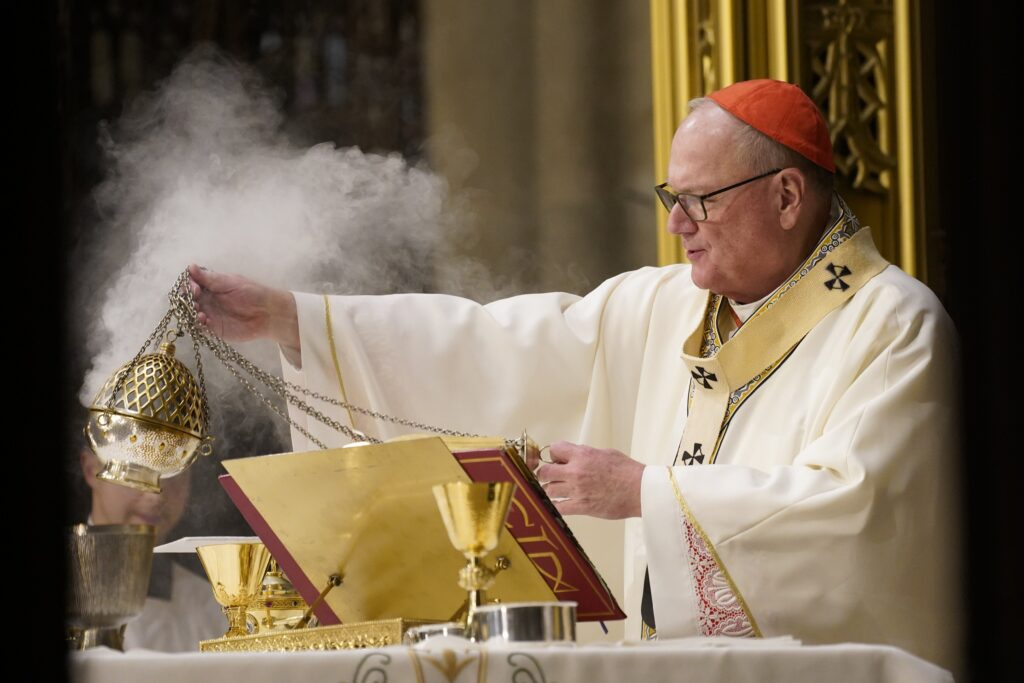

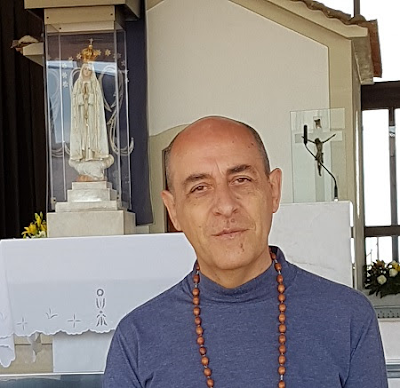


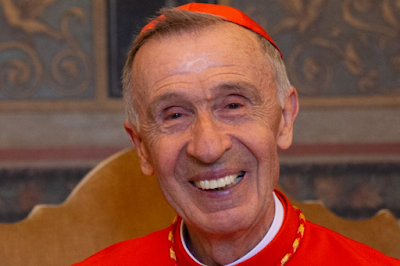
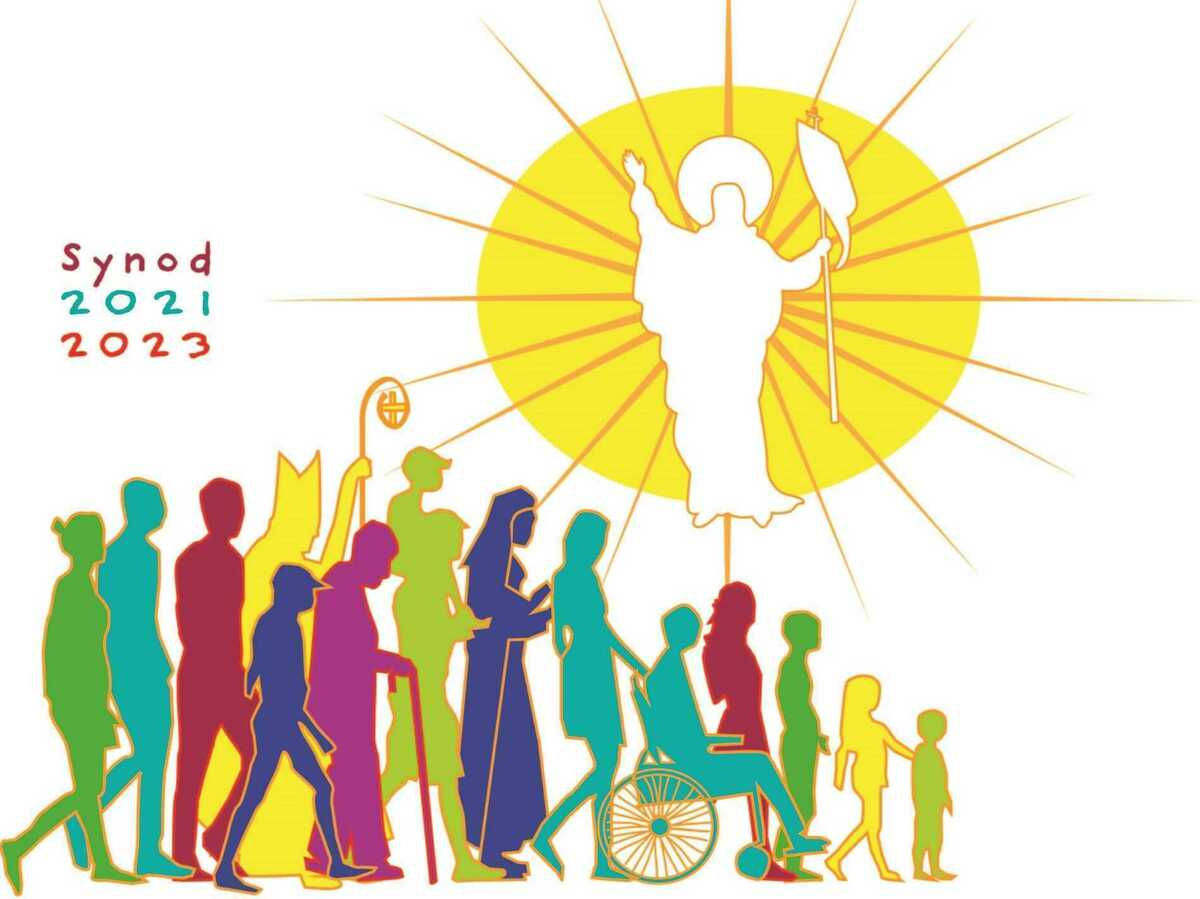


.jpg)
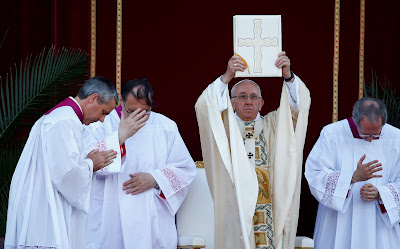

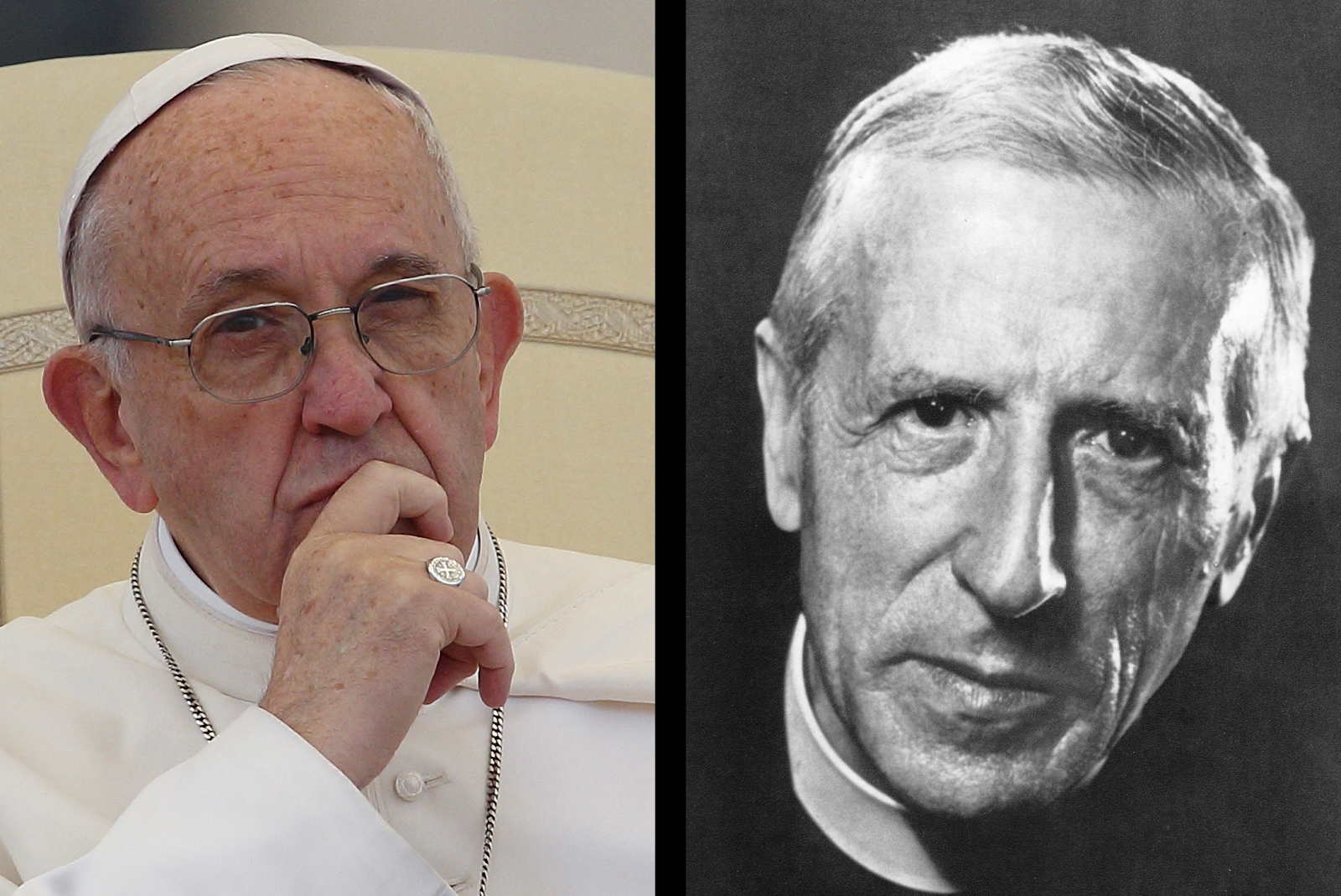

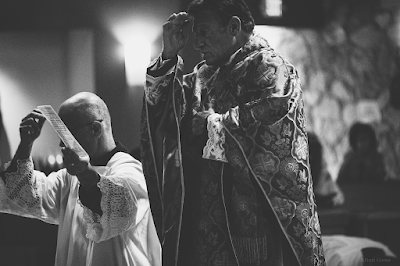









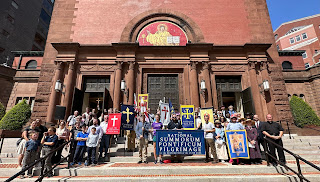
.jpg)

